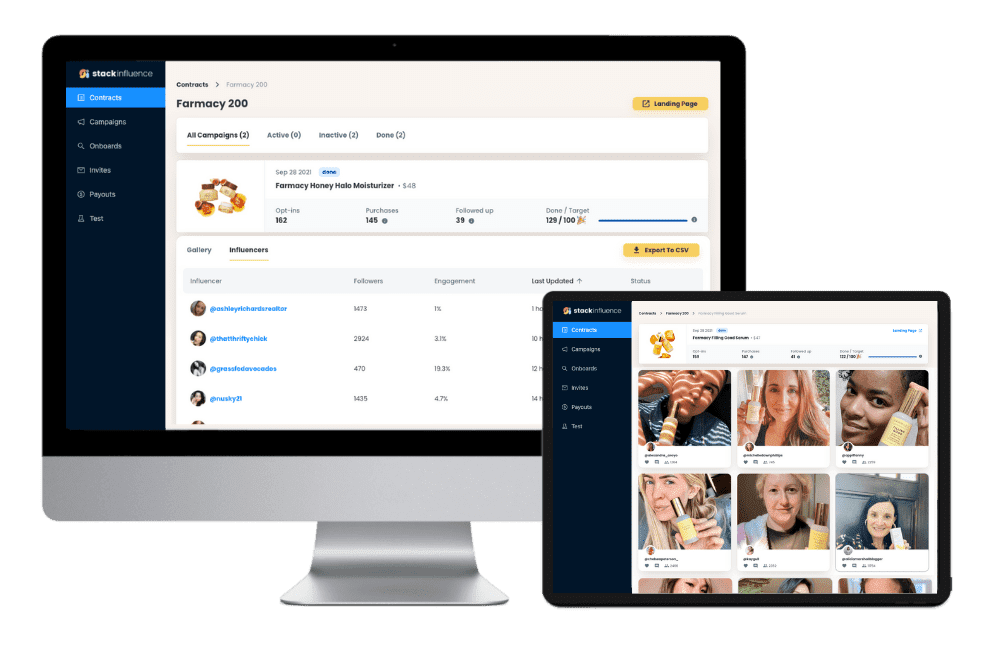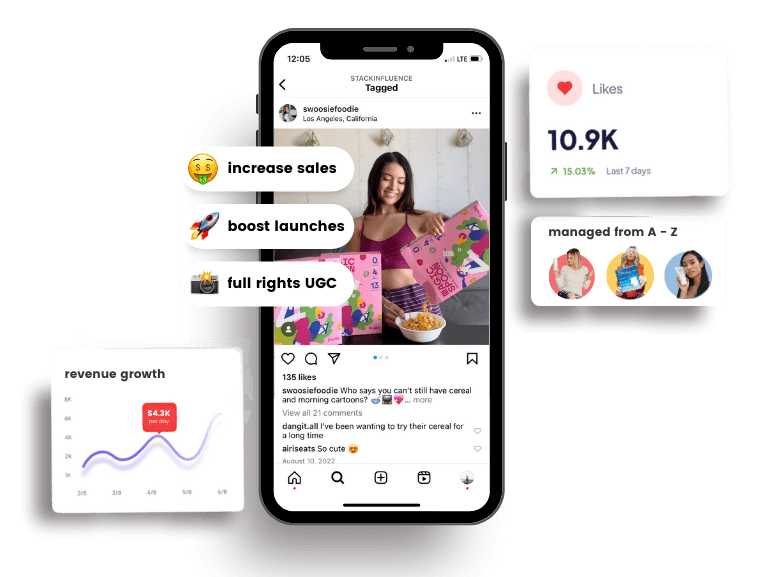Employees as Influencers: Brand Advocacy
12th
November, 2025
Influencer Marketing
Amazon Marketplace
Artificial Intelligence
TikTok Tips
In today’s influencer marketing landscape, a new player is emerging alongside social media stars and content creators: your own employees. Employees as influencers are quickly becoming the new face of brand advocacy for companies of all sizes, from global retailers to e-commerce startups and even Amazon sellers. The concept is simple yet powerful – when the people behind your brand (from founders to front-line staff) promote it through their personal networks, they often come across as authentic micro influencers rather than corporate mouthpieces. This approach blends the credibility of peer recommendations with the scale of social media, yielding impressive results in reach, engagement, and trust.
Such posts also generate around 8× more engagement from audiences. Most importantly for sales, leads developed through employees’ social media are 7× more likely to convert into customers. This outsized impact makes sense when you consider that the average staff member’s social network is about 10× larger than their employer’s and about 90% of their contacts are new to the brand. In other words, empowering your team to share and create content opens up huge, untapped audiences that traditional marketing might never reach. And because the content comes from real people, it feels like genuine user-generated content (UGC) – boosting authenticity and trust (76% of individuals say they trust content shared by “normal” people more than by brands!). Below, we explore how forward-thinking brands are turning various types of employees into influential advocates, and how you can leverage this strategy for your own business.
Founders Stepping Up as Influencers
When it comes to putting a human face on a brand, founders are leading the pack. There’s no one more passionate or knowledgeable about a company than its founder, which is why many founders today actively cultivate their own social media presence as an extension of the brand. Industry experts have observed that in the past couple of years, “founders as influencers or content creators have burst upon the scene in a big way”, bringing a unique authenticity and behind-the-scenes perspective to their marketing. By sharing personal stories, values, and day-to-day business insights, founders can forge deeper connections with customers than a faceless corporate account ever could.
Some notable examples illustrate this trend. Emily Weiss of Glossier essentially was the influencer behind her beauty brand’s meteoric rise – she leveraged her personal blog and Instagram following to build hype for Glossier’s products through relatable content and honest dialogue with fans. Similarly, Matilda Djerf turned her lifestyle and fashion influence into fuel for her clothing line Djerf Avenue, blurring the line between founder and influencer. These founder-led influencer strategies paid off in spades, helping both brands cultivate a loyal, engaged community of customers who felt personally connected to the brand’s journey. Inspired by such pioneers, newer entrepreneurs are following suit. For instance, Nadya Okamoto, founder of period care brand August, amassed millions of TikTok followers by mixing candid lifestyle posts with educational content about her company’s mission. By stepping into the spotlight themselves, founders humanize their businesses and create a trust-based bond with consumers – effectively becoming high-impact brand ambassadors with a built-in audience.

Unlock the Power of Micro Influencers and Elevate your Brand Today!

Social Media Managers as the Brand’s Personality
Beyond the C-suite, social media managers are becoming the new “face” of the brand. In many companies, the person running the social accounts has moved from behind the screen to in front of the camera. The idea is that audiences online are more likely to engage with a brand if they can relate to a real personality, not just a logo. Brands like Ryanair, Wendy’s, and Duolingo have famously adopted a bold, human voice on social media – often driven by witty individuals or creative teams – and it pays off. By giving social managers the freedom to infuse humor, candor, and even a bit of quirk into content, these brands come across as more authentic and approachable. Followers feel like they’re interacting with a friend or an entertainer rather than being marketed to, which increases trust and virality.
A standout case is Duolingo, the language-learning app whose TikTok presence became a viral sensation. Duolingo’s social media manager (along with their lovable owl mascot, “Duo”) frequently appears in TikTok videos, hopping on trending memes and poking fun at the brand itself. The result has been explosive growth in audience and engagement – Duolingo’s TikTok account now boasts over 12 million followers and regularly racks up millions of views per video. Crucially, this translates to real business impact: the company saw a 62% increase in daily active users in the year after embracing this playful, human-centric social strategy. In other words, by letting a real employee with a distinct personality represent them online, Duolingo not only entertained people but also drove more app usage (a clear ROI for an education app). The key is giving these employees creative freedom to be authentically themselves. As long as their content aligns with brand values, even if it’s “lo-fi” or a bit irreverent, it resonates far better with today’s audiences than polished corporate PR. We’ve entered an era where a sassy TikTok from an airline or a joking reply from a fast-food chain’s Twitter can massively boost brand affinity. Savvy companies are realizing that their own social media managers, when empowered, can double as influential content creators who humanize the brand in the eyes of the consumer.
Hiring Influencers and Content Creators In-House
Another innovative approach to employee advocacy flips the script on traditional influencer marketing: hiring established content creators as full-time employees. Instead of only partnering with influencers for one-off campaigns, some brands are bringing influential creatives onto their payroll to supercharge their social content. The logic here is simple – if you employ someone who already is a talented creator (and maybe even a micro influencer in their own right), they can devote all that skill and insider knowledge to your brand 24/7. It’s a marriage of influencer marketing and company culture, and it can yield rich results in engagement and brand relevance.
For example, activewear brand SET Active decided to recruit popular TikTok creator Sam Vicchiollo (who had over 2 million followers) to run their social media. The impact was immediate: with Sam’s finger on the pulse of Gen Z trends and his knack for relatable humor, SET Active’s content quickly became, in the words of one observer, “more relatable and more fun” for young audiences. By trusting an influencer-turned-employee to helm their socials, the brand was able to build trust with Sam’s existing fanbase and infuse a fresh, authentic vibe into their marketing. This strategy acknowledges that content creators know how to engage communities – it’s what they do best – so bringing that talent in-house can dramatically boost a brand’s creative output. We see similar moves in other companies: some have hired YouTubers to lead video production, or Instagram photographers to create in-house visuals for e-commerce product lines. Even smaller Amazon sellers and DTC startups are catching on, sometimes offering brand ambassador roles or creative positions to enthusiastic fans or micro influencers who love their products. The benefit is twofold: the company gets a stream of high-quality, organic-feeling content (essentially constant UGC for the brand), and the creator gets a stable role where they can focus their passion on one brand they genuinely support. It’s a win-win that blurs the line between employee and influencer – the content creator employee wears both hats. As a bonus, they often bring their own follower base along with them, expanding the brand’s reach without a dime spent on traditional ads.
Turning Retail Employees into Brand Advocates
Not all employee influencers sit at a desk – some of the most effective brand advocates are on the store floor or out in the field. Brands are increasingly activating their retail and frontline employees as influencers, recognizing that these folks engage with customers every day and carry huge credibility. If you’ve ever asked a sales associate for a product recommendation, you know how much weight an employee’s opinion can hold. People see them as product experts and “people like me” at the same time. Now, with social media, a store clerk’s helpful tip isn’t limited to one customer at a time; it can potentially reach thousands.
A great example comes from fashion retailer Abercrombie & Fitch, which consciously encourages its store associates to be content creators. Abercrombie’s social team will feature real employees – not just professional models or influencers – in TikTok videos and Instagram posts, showing off new styles or giving behind-the-scenes glimpses of store life. The company’s philosophy is that anyone can be an influencer with the right platform. “At the end of the day, we’re all humans, we all have influence and we all consume. So it’s really about creating content that resonates,” explained Abercrombie’s VP of Marketing when discussing why they put employees front and center on social media. And resonate it does – these authentic clips of employees styling outfits or sharing their favorite picks often perform as well as, if not better than, polished ads. Similarly, cosmetics retailers like Sephora have long known the power of employee advocacy; their beauty advisors’ recommendations drive sales in-store, so extending that expertise to online beauty tutorials and product reviews is a natural evolution. By tapping the genuine enthusiasm and knowledge of their teams, brands can produce a steady flow of trustworthy, peer-to-peer content. These retail staff influencers might only have small “micro” followings individually, but collectively they amplify the brand’s voice significantly. Plus, their content tends to feel more sincere and service-oriented (it’s an employee genuinely wanting to help customers), which can greatly enhance brand perception and loyalty.
Why This Matters for E-commerce and Amazon Sellers
You might be thinking: This is great for big brands, but what about smaller companies or online sellers? The truth is, employees as influencers can be a game-changer for e-commerce businesses and even individual Amazon sellers. In the crowded online marketplace, trust and authenticity are at a premium. Shoppers have grown savvy to glossy ads and generic product copy – they crave recommendations and content that feel real. This is where turning your team (no matter how small) into brand advocates can set you apart.
For many e-commerce startups, the founder or a handful of employees are the core marketing team. Embracing an employee-influencer mindset means showcasing the people behind the product. For instance, a boutique Shopify store could have team members do Instagram Live sessions demonstrating how they use the products, or a small kitchen gadget brand might feature the founder’s family and friends (who help with the business) in TikTok videos trying out recipes with the gadget. These unscripted, down-to-earth snippets serve as compelling UGC – exactly the kind of content that draws in scrollers and builds credibility around your product. Even Amazon sellers, who primarily operate on a marketplace, can leverage this through external channels: e.g. sharing short behind-the-scenes videos of order packing (ever seen those oddly satisfying packing TikToks?), or employee spotlights that convey your brand’s values and story. By humanizing your online store in this way, you give customers a reason to choose you over a faceless alternative. It’s also a cost-effective marketing strategy. Rather than pouring budget into hiring big influencers, you’re cultivating micro influencers from within. Often, these employee-driven efforts spark word-of-mouth momentum at very little cost. Platforms like Stack Influence have built on this principle, connecting brands with micro influencers to generate authentic content – but remember that your very own staff can often play that role too. Whether you run a niche Etsy shop or a private-label Amazon brand, encouraging any partners or employees you have to share their genuine love for your products can boost your reach in an organic, sustainable way. It’s influencer marketing meets home-grown evangelism, and it can work wonders for e-commerce growth.

Unlock the Power of Micro Influencers and Elevate your Brand Today!

Tips to Harness Your Employees as Influencers
Ready to turn your workforce into a tribe of passionate brand champions? Here are a few tips to get your employee influencer program off the ground:
-
- Identify Your Internal Enthusiasts: Start with employees who love the brand and are active on social media. Whether it’s a salesperson with a knack for TikTok or an engineer who blogs on LinkedIn, these are your potential micro influencers in the making. Enthusiasm and authenticity are more important than follower count at first.
- Provide Guidance and Creative Freedom: Set some basic social media guidelines (appropriate language, brand hashtags, etc.) and training so employees feel comfortable sharing. Then step back and let them post in their own voice. Content comes off as more genuine when it isn’t micromanaged by corporate. Trust your team to know how to connect with their peers – maybe with a dash of humor or personal story that humanizes the brand.
- Recognize and Reward Engagement: Encourage a culture of advocacy by celebrating employees who successfully drive engagement. This could be as simple as shouting them out in internal newsletters or as formal as incentive programs for employees whose posts perform well. When people see that their contributions matter (and even help the company’s bottom line), they’ll be even more motivated to share.
- Equip Them with Shareable Content: While spontaneous posts are great, it also helps to regularly supply employees with fresh content they can easily share – for example, a cool product photo, a customer testimonial, or a short video clip from a recent event. Make it turnkey for busy team members to participate. Many companies create an internal content library or Slack channel for this purpose. Just ensure there’s variety and room for personal touches, so posts don’t become too cookie-cutter.
- Measure Impact and Iterate: Treat your employee advocacy initiative like any other marketing effort – track key metrics. Monitor increases in social followers, engagement rates, referral traffic, or even sales leads attributable to employee posts. (Remember those stats about reach and conversion – now you can see them in action for your brand!) Use analytics to highlight wins and learn what type of content resonates best. Then refine your strategy and keep the feedback loop going with your team.
- Identify Your Internal Enthusiasts: Start with employees who love the brand and are active on social media. Whether it’s a salesperson with a knack for TikTok or an engineer who blogs on LinkedIn, these are your potential micro influencers in the making. Enthusiasm and authenticity are more important than follower count at first.
Conclusion to Employees as Influencers
By following these steps, you can cultivate a powerful program where employees as influencers drive awareness and trust for your brand. It’s a strategy rooted in authenticity and human connection – assets that money can’t directly buy, but can yield incredible ROI. When your micro influencers on payroll are out there genuinely vouching for your company, customers take notice. In the end, empowering your employees to tell your story turns marketing into a team sport – and your brand will be all the stronger for it. Embrace this new face of brand advocacy, and watch the ripple effect as sincere, word-of-mouth marketing spreads across social networks, one employee post at a time.

By William Gasner
CMO at Stack Influence
William Gasner is the CMO of Stack Influence, he's a 6X founder, a 7-Figure eCommerce seller, and has been featured in leading publications like Forbes, Business Insider, and Wired for his thoughts on the influencer marketing and eCommerce industries.
Want new articles before they get published? Subscribe to our Awesome Newsletter.
stack up your influence
turning creativity into currency
our headquarters
111 NE 1st St, Miami, FL 33132
our contact info
[email protected]
stack up your influence
turning creativity into currency
our headquarters
111 NE 1st St, 8th Floor
Miami, FL 33132


